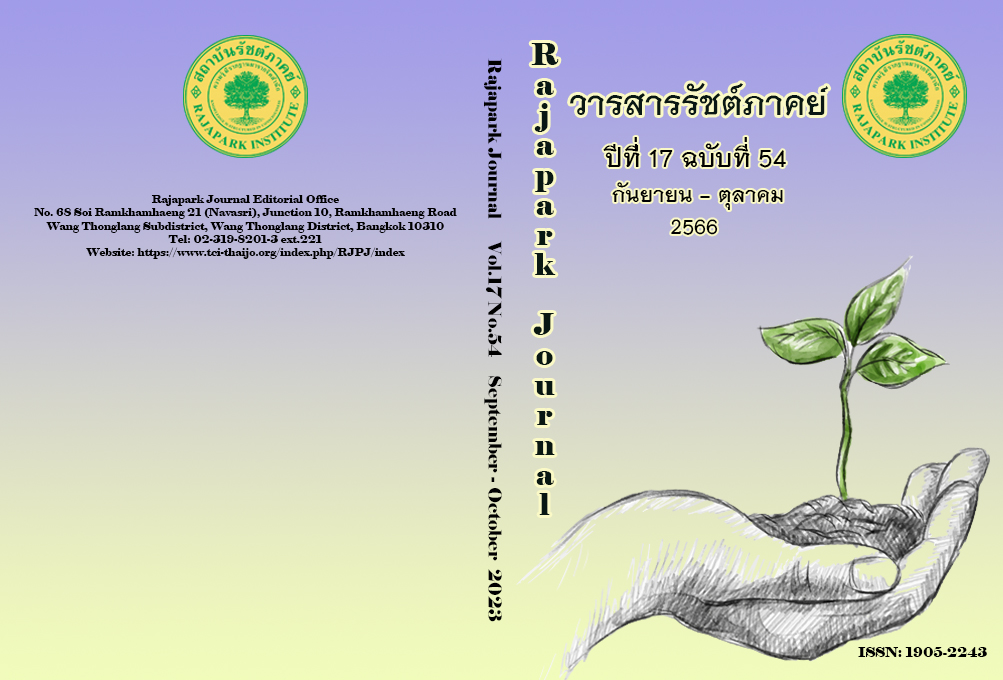Protection of Consumer Rights in Digital Content Games Online
Main Article Content
Abstract
This research aims to fulfill the following objectives: 1) To comprehensively examine and gain a deep understanding of the current provisions of Thai law pertaining to the regulation of randomization in online games, specifically focusing on digital contents. Additionally, it seeks to explore the legal rights of consumers concerning these digital contents. 2) To conduct a thorough analysis and comparative study of foreign legal frameworks alongside Thai laws governing random digital contents in online games. Special attention will be given to the legal rights of consumers in relation to digital contents obtained through randomization. 3) To undertake an in-depth study aimed at proposing improvements and revisions to the existing legal framework governing random digital contents in online games within Thailand. This study will also encompass suggestions to enhance the legal rights of consumers in relation to digital contents obtained through random mechanisms. This research delves into a qualitative examination employing document analysis as its primary methodology. The study focuses on scrutinizing a wide range of documents, including scholarly articles and pertinent information derived from foreign electronic media sources. The research findings reveal that Thailand currently lacks specific laws or provisions governing the randomization of digital contents in online games, as well as the legal rights of consumers concerning these contents. Consequently, the following legal issues arise: 1) The absence of regulatory measures for online games that employ random distribution of digital contents, leading to significant regulatory gaps. 2) The lack of explicit legal provisions that define and safeguard the rights of consumers regarding digital contents obtained through randomization in online games.
Article Details

This work is licensed under a Creative Commons Attribution-NonCommercial-NoDerivatives 4.0 International License.
Views and opinions appearing in the Journal it is the responsibility of the author of the article, and does not constitute the view and responsibility of the editorial team.
References
Cawthorne, B. (2019, Sep 19). 11 Things You Should Know About Loot Boxes. UK Safer Internet Centre. https://saferinternet.org.uk/blog/11-things-you-should-know-about-loot-boxes.
Consumer Protection Act, B.E. 2522. (1979, April 30). Government Gazette, Vol. 96, Part 72, Special Issue, pp. 20.
Decree The provisions of the Civil and Commercial Code, Books 1-2, which have been Revised B.E. 2535. (1992, April 8). Government Gazette, Vol. 9, Part 42, pp. 1.
Dibbell, J. (2003). Black Snow Interactive and the World’s First Virtual Sweat Shop. http://www.juliandibbell.com/texts/blacksnow.html.
Direct sale and Direct marketing Act, B.E. 2545. (2002, April 23). Government Gazette, Vol. 119, Part 40 B.
Entertainment Software Rating Board. (2020). Introducing a New Interactive Element: In-Game Purchases (Includes Random Items).
https://www.esrb.org/blog/in-game-purchases-includes-random-items/.
eukeik .ee. (2021, Nov 26). How Big is the Gaming Market in Thailand? and Which Market is the Largest?. Marketeer. https://marketeeronline.co/archives/241572.
Gambling Act, B.E. 2478. (1935, Jan 31). Government Gazette, Vol. 52, pp. 1978.
Hanyue, W. (2020). Intangible Property: Protection of Virtual Property in Electronic Games in China and US. Journal of Finance Research, 4(2), 119-123. DOI:10.26549/jfr.v4i2.3752
Korea Law Translation Center. (2006). Game Industry Promotion Act. https://elaw.klri.re.kr/eng_mobile/viewer.do?hseq=46844&type=part&key=17.
Lawinfochina. (2016). Notice of the Ministry of Culture on Regulating the Operations of Online Games and Strengthening Interim and Ex Post Regulation. http://lawinfochina.com/display.aspx?id=26071&lib=law&EncodingName=big5.
Nawatrakulpisut, N. (2020). Consumer Protection Law (2nd ed.). Thammasat University.
Obedkov, E. (2023). South Korea Pass New Amendment on Loot Box Probability Disclosure. https://gameworldobserver.com/2023/02/28/south-korea-loot-boxes-probability-disclosure-law.
Pasom, P. (2013). Online Games. Sanook.com. https://guru.sanook.com/6335/.
Rose, N.I. (2006). Gambling and the Law: An Introduction to the Law of Internet Gambling. UNLV Gaming Research & Review Journal, 10(1), 1-14. https://digitalscholarship.unlv.edu/grrj/vol10/iss1/1
Rouse, M. (2012, May 25). In-Game Purchases. Techopedia. https://www.techopedia.com/definition/27615/in-game-purchases.
Schreier, J. (2017, Oct 11). ESRB Says It Doesn’t See ‘Loot Boxes’ as Gambling. KOTAKU. https://kotaku.com/esrb-says-it-doesnt-see-loot-boxes-as-gambling-1819363091
Settabhut, J. (2013). Obligation Law (21st ed.). Textbook and Teaching Document Project, Faculty of Law, Thammasat University.
The Constitution of the Kingdom of Thailand, B.E. 2550. (2007, August 24). Government Gazette, Vol.124, Part 47 A.
The Constitution of the Kingdom of Thailand, B.E. 2560. (2017, April 6). Government Gazette, Vol.134, Part 40 A.
Fields, T. (2014). Mobile & Social Game Design (2nd ed.). Taylor & Francis Group.
Unfair Contract Terms Act B.E. 2540. (1997, Nov 14). Government Gazette, Vol. 114, Part 72 A.
Yoon, U. (2008). Real Money Trading in MMORPG Items from a Legal and Policy Perspective. Journal of Korean Judicature, 1(1), 418-477. http://dx.doi.org/10.2139/ssrn.1113327


